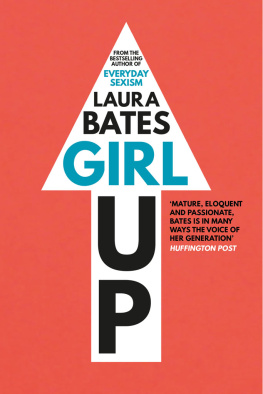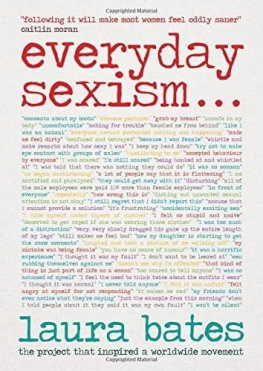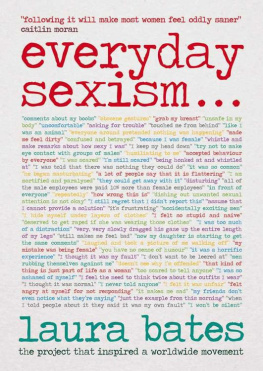First published 1997 by Routledge
Published 2013 by Routledge
2 Park Square, Milton Park, Abingdon, Oxon OX14 4RN
711 Third Avenue, New York, NY 10017, USA
Routledge is an imprint of the Taylor & Francis Group, an informa business
Copyright 1997 by Routledge
Design: Jack Donner
All rights reserved. No part of this book may be reprinted or reproduced or utilized in any form or by any electronic, mechanical, or other means, now known or hereafter invented, including photocopying and recording, or in any information storage or retrieval system without permission in writing from the publishers.
Library of Congress Cataloging-in-Publication Data
Ronai, Carol Rambo
Everyday sexism in the third millennium / edited by Carol Rambo Ronai, Barbara A. Zsembik, Joe R. Feagin.
p. cm.
Includes bibliographical references and index.
ISBN 978-0-415-91551-9 (pbk)
1. SexismUnited States. 2. Sexual harassment of womenUnited States.
3. HeterosexismUnited States. 4. Sex roleUnited States.
I. Zsembik, Barbara A. II. Feagin, Joe R. III. Title.
HQ1237.5.U5R65 1997
CAROL RAMBO RONAI, BARBARA A. ZSEMBIK, AND JOE R. FEAGIN
I think the overall goal of the feminist movement has been to promote homosexual powernot womens equality.
You must be willing to work for the rights that other people have earned through hard work instead of whining for them so just shut the hell up about it.
Modern feminism should not deny or overlook the fact that a substantial segment of our society is changing for the better; in other words, dont let a few narrow minded, ignorant few dampen the significant progress which has been achieved over the years.
Student responses to an informal survey on feminism, conducted by
the Memphis Womans Action Coalition,
a campus student organization.
The editors of this volume have had common experiences in the classroom and workplace that were the genesis of this collection. Each of us has been issued the following challenge by our students and colleagues: Sexism is a thing of the past, so why spend so much time on it in the classroom? Other remarks, such as Things are better now than they used to be, women should quit whining and get over it, and With everyone walking around on eggshells about sexism, it makes it seem like more of a problem than it really is, have revealed to us an atmosphere where students and colleagues seemed to be angry, uncomfortable, or fearful about discussing sexism.
Additionally, students and colleagues over the years have voiced doubts and fears about feminist theory, finding it alienating and irrelevant to their everyday lives. Women confessed to us that they agree with the basic tenets of feminism, but they do not want to be thought of as overbearing or unfeminine, or to be ascribed the dreaded status of lesbian. Men have voiced fears about not knowing how to act towards women, losing power over their lives to women and seeming unmanly (that is, homosexual) for embracing a feminist perspective.
As we stand on the threshold of the twenty-first century, we believe that now, more than ever, it is time to take stock of current experiences with and perceptions of sexism. We are living at a particularly crucial historical moment for examining the problem of sexism. Many popular observers and authors have recently argued that sexism is exaggerated if not on the decline in the United States. The current climate in the classroom and workplace reflects this conservative rhetoric about the decline of sexism, yet the content of this volume strongly suggests otherwise.
From debates like this, we determined that there is much confusion about what sexism and feminist thinking are, and have decided that it would be useful to address the following questions in an edited collection: Is there still sexism in the late twentieth century? And if so, how does it manifest in our everyday lives?
The social and political climate as it is reflected in the classroom and in the contemporary mass media suggests that sexism has been in the nations collective consciousness and in our collective discourse. In the last few years, the mass media have given increased emphasis, if not intelligent analysis, to sexism in everyday life. If we accept the news as a reflection of the issues we deal with in our everyday lives, then we must concede that sexism is a topic that concerns us all. One has only to read accounts of events like the 1995 O.J. Simpson trial in Los Angeles to hear discussions about domestic violence (Should the police and the judicial system have responded differently to Nicole Brown Simpson s 911 calls for help?) or about gender discrimination in the workplace (Should Marcia Clark, the prosecuting attorney, have lost her children to her ex-husband for spending too much time working on the Simpson case?). Similarly, the early 1990s congressional hearings on Clarence Thomass nomination to the Supreme Court served, in light of the accusations of sexual harassment from his subordinate Anita Hill, to heighten the national debate about sexual harassment.
This edited collection features new and original research from the 1990s on the range of sexism still faced by girls and women in this society. In an examination of the chapters, the reader will encounter diverse and innovative research materials that overwhelmingly contradict the commonplace sentiment that the existence of sexism is exaggerated in U.S. society. These new empirical materials document gendered oppression as it is endured by women of various age, racial, ethnic, class, and sexual orientation groups. In this book we add greater depth to our knowledge of the daily lives and experiences of women in a wide range of interactive settings, including the home, the workplace, unions, educational institutions, and the Internet.
Gender and the Matrix of Domination
Most social scientists accept the view that gender is a critical component in understanding social experiences. Increasingly, many social scientists also recognize the importance of examining the effects of gender in their own research, offering a useful corrective to a predominantly male-dominated social science. Nonetheless, in much research there is still a tendency to think of gender only as a variable or as an individual trait (Stacey and Thorne 1985). From our perspective, gender should be viewed as an aspect of social organization, not a variable or trait. Sexism is a far more complicated process than men oppressing women at every turn. It is part of a larger system of social organization, which includes, among other things, the actions and consciousness of women themselves, who can in their turn reinforce or resist sexism. In addition, gender is only one of several overlapping social hierarchies that organize human relationships within a society like the United States.
Feminist scholars such as Patricia Hill Collins (1990), Marilyn Frye (1983), Audre Lorde (1984), and Dorothy Smith (1979) have observed that boys and girls, men and women, are situated within several different but related systems of domination and oppression. We have sought out researchers who can enlighten us on the interrelationships among these systems. In the articles in this collection, the reader will find domination and oppression located at the intersection of gender and racial groups in eight of the articles; of gender and class in two of the articles; of gender, ethnicity, and class in one; and of gender, class, and sexual orientation in one.












